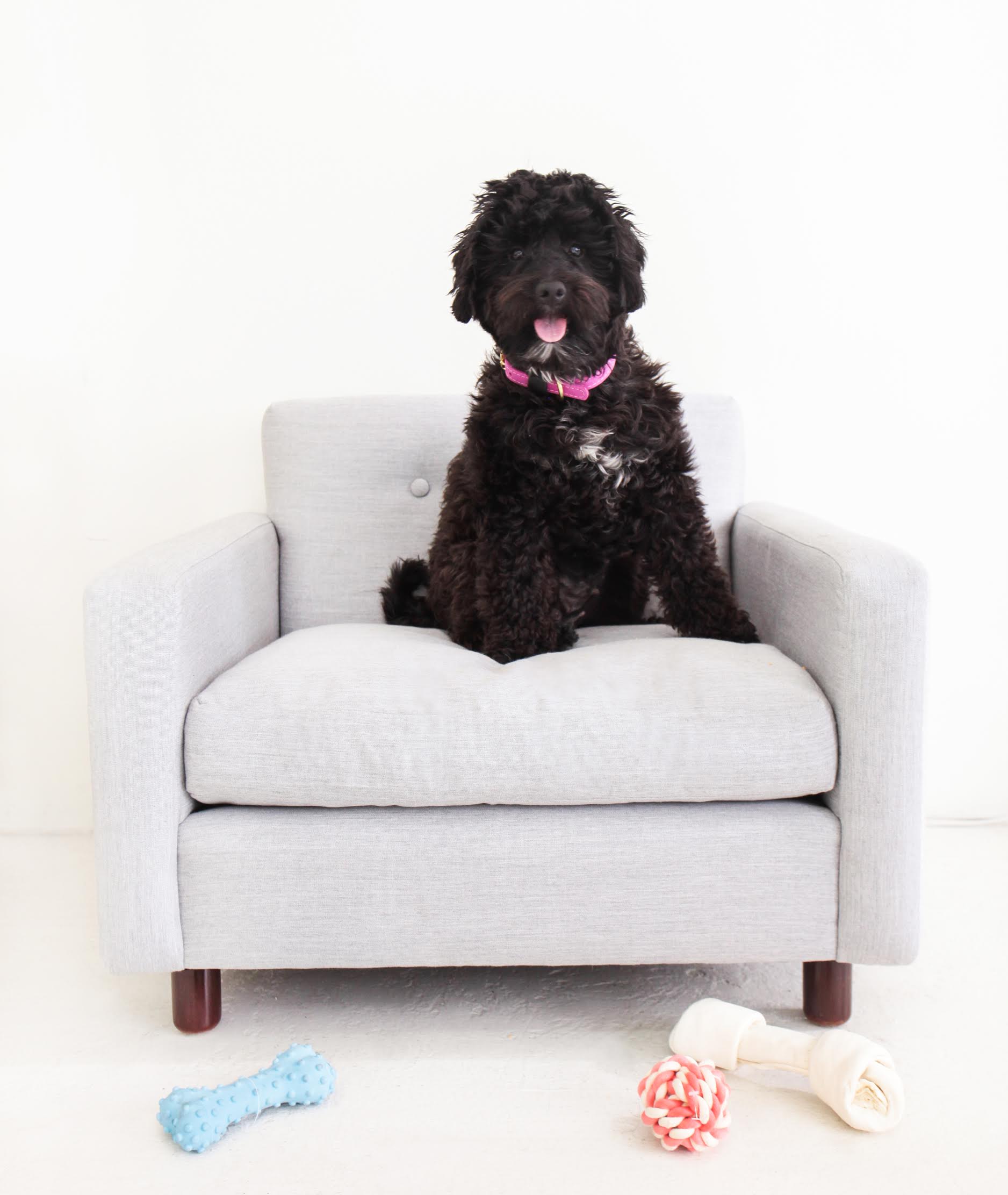Tuesday Ten: Tips for New Dog Owners

Because I’m not an expert on the topic of dogs (just a new mama to a cute little pup), I’ve enlisted the help of Lesley Brog, the founder of Wags and Walks, to help me share 10 tips for all of you new or prospective dog owners. And lucky for us, Lesley knows what she’s talking about. Since she started Wags and Walks 3 years ago, they’ve saved over 1,000 dogs from shelters and have placed them in loving forever homes. If you live in Southern California and are looking for the perfect furry addition to your family, I would highly recommend checking out their website.
Anyways, if you’re in the market for a new pup or you’ve recently brought one home for you, here are 10 tips to make new puppy parenthood a little bit easier.
- Puppy Proof Your Home.
Lesley says, “Even if your dog is older, curiosity can get the better of him. Make sure your home is a safe place for him by putting yourself in his paws. Put yourself at their eye level: Crawl around on the floor and check out any potential dangers. Electrical cords, poisonous houseplants, and any item small enough to swallow are just a few of the things that should be out of his reach. Veterinarians perform more surgeries to remove strange objects that a dog has swallowed than for anything else.” - Get Your Gear.
My first stop after picking up Winnie was my local Healthy Spot. There, I was able to pick up the essentials: a collar and leash, a crate, a cozy little bed, dog food, treats, poop bags, toys, etc. Some of my favorite finds are her Yark collar and leash, a really cute bed from Jax & Bones, Earthbath Grooming Wipes (they come in a Green Tea scent which I love) for wiping her paws before bed and her Fluff & Tuff stuffed animals. - Get to the vet.
The day I brought Winnie home I immediately asked around about local vets and made an appointment for her for the following day. They made sure she was up to date on shots, gave me recommendations on what food she should be eating, and made sure she was healthy and doing well. Not only do you want to find a vet close by, but you’ll also want to locate a 24 hour pet hospital (in case your vet is only open during business hours) that you can take your pup to incase of an emergency. - Microchip + Register.
This one is so important and can be taken care of at your vet appointment. Lesley says, “If your city requires dogs to be licensed, get this taken care of right away. Licenses can usually be purchased at the Vet’s office. Even if your city does not require a license, it’s a good idea to get your pup microchipped and also provide the dog’s name, your name and your contact information on your dog’s collar. If your pet is lost or stolen, microchipping will ensure his or her safe return. Collars can come off, but microchips are there to stay.” - Clear Your Calendar.
If at all possible, I recommend clearing your schedule for the next couple weeks so that you don’t have to leave town while you’re getting to know your new family member. Now, I’m not saying call in sick to work and never leave the house… but if at all possible, try not to go out of town on vacation and leave your pup with someone else during the first couple months. It is important bonding time, and especially for rescue pups, being around will help them get used to their new life and their new home. On the other hand, you don’t want to spend every single second with your dog, otherwise they’ll get used to having you around all the time. So make sure to keep your schedule as it normally is… just try not to leave your pup while you head out on vacation ’til they’re used to their new life. - Reach Out to fellow puppy parents.
One thing that no one ever told me about having a dog of your own is that it’s kind of scary. I grew up with dogs, but they were never really my responsibility. With Winnie, it’s a whole different story. I had become completely responsible for every aspect of this animal’s life. And that’s a scary notion. I was so nervous and anxious the first few days that I could barely eat, and was completely overwhelmed with the entire prospect of this new puppy in my life. But like most things do, that passed. So if you’re a new puppy parent and you feel totally overwhelmed or have questions, reach out to your friends who have dogs. They’ll calm you down, give you tips and give you the extra confidence you need when dealing with a brand new pup. - Enroll in puppy class.
Even if your dog is a rescue and is somewhat trained (lucky for me, Winnie was completely potty trained when I adopted her), it’s still a good idea to go back to the basics and enroll in a puppy class. Your dog will get socialized, learn basic commands and become much easier to handle on a daily basis. If you’re in LA, I recommend Michael Chill’s group class, which Winnie and I are currently enrolled in. - Set Rules.
“It can be tempting when you bring home a new dog to be a little lax on the rules,” says Lesley. “But resist the temptation now so you can avoid problems later on. It’s much easier to prevent a bad habit from starting than it is to break one. Not only that, but dogs, like children, would rather have rules and structure. It makes them feel more secure to know exactly what is expected of them and exactly what happens if they don’t follow the rules. It also keeps order in the household. If you have other pets that already know the rules, they can get quite stressed out by an unruly newcomer. Whatever you do, do NOT feel sorry for your poor little rescue dog. Nobody wants pity, dogs included. For your dog’s best interest, put whatever sad past he may have had behind him and live in the current moment. He’s with you now, happy and cared for.” - Expect those rules to be broken.
Lesley also said to expect your dog to break the rules frequently in the beginning. “He is not being stubborn or difficult. Dogs have a hard time generalizing, which means that something he learns in the living room will have to be learned all over again in the kitchen and again in the bedroom. It’s easy to get frustrated when you feel like he should understand already, but he still doesn’t. It helps to have a sense of humor. It can take 30-50 or more perfect repetitions before a dog truly gets a command.” - Introduce Outside.
This one is for those of you who already have a dog or cat in your family: Lesley’s advises, “If you have another pet at home, let your pet(s) meet the new dog before he comes into the house, if possible. I recommend taking the dogs on a walk together so they begin to feel like a pack and can start to bond without feeling territorial. Also, try to keep you other dog’s routine.” That way, your older pup can adjust to the new family member without feeling like their world just got turned upside down.
This might sound like a lot, but trust me, it’ all completely doable. And I have to say, adopting this little animal has been the best decision I’ve ever made. She has her challenges, but she brings me so much happiness and love on a daily basis and just makes life better. For those of you contemplating adopting a dog (please adopt, don’t shop!), I can’t recommend it enough. It’s definitely a lot of work, but the rewards are so much greater than I can ever explain.
And thank you to Lesley of Wags and Walks for the tips… and also for bringing Winnie into my life!
Do you have any tips to add to the list?
Leave them in the comments!
Xoxo Rachel
Team LC
P.S. The adorable photo of Winnie at the top of the post was taken by Tessa Neustdat for Yark.
